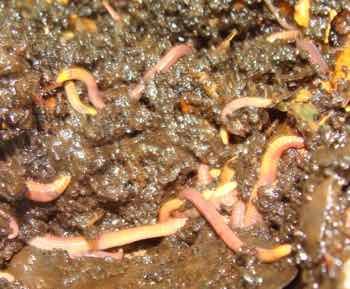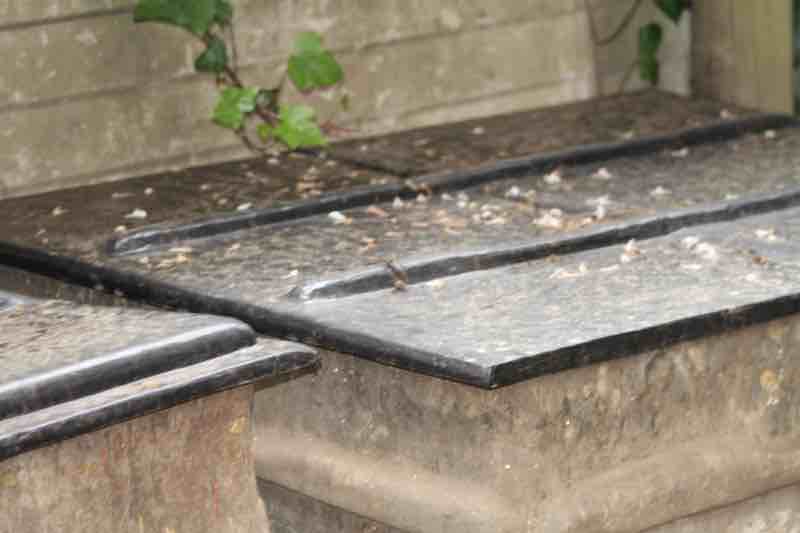- Homepage
- Worm farms
- Air in Worm Farms
Air in worm farms
Air in worm farms is very necessary otherwise a stink will soon inform you that all is not well in the state of Denmark. Worse, the temperature will rise and they'll be crawling out of your container.
Worms are aerobic creatures just like us; they need oxygen to exist. With not enough air near the bottom of the container, they won't delve deep into the feedstock. Then it will rot and start to smell.

This page was last updated by Bernard Preston on 7th January, 2026.
To prevent this problem it is important in the first instance to add plenty of friable material. Various authorities recommend the use of cardboard in worm farms.
That also raises the carbon content which is important for the critters.
However I am reluctant to do that because of the chemicals used in the manufacture of cardboard.
Outer leaves of cabbages and corn
Our solution is to add the outer leaves of cabbages and corn; the roots and stems too. Chop them roughly with a spade. They are plentiful here but any coarse organic material from the garden would do.
This friable material must be well-worked into the rotting food that is being used but be careful not to make an impermeable layer to both the worms and oxygen.
Do not compact the feed-stock down; it should be as rough and crumbly as possible to let in the air.
Recent experiments suggest that best of all is to cover the contents of your worm farm with a loose array of whole cabbage leaves or corn husks. They love the dark and when you lift a leaf you'll find a myriad of creepy-crawlies just below.
Air in worm farms
Air in worm farms can be helped by regular tossing of the contents of the container.
We recommend that once a week you take a garden fork and gently work the contents of your worm farms; loosen the material, allowing air to penetrate deep into the container.
Do not try to invert the feed-stock; twisting the implement slightly will permit oxygen to get to the wrigglies nearer the bottom.
In particular look for any areas where the material is compacted; gently tossing it will help prevent anaerobic bacteria from flourishing.
Watch out for an unpleasant smell and any sign of the worms crawling out of the container.
This is especially true if it gets hot, either from the ambient temperature or too much nitrogen-rich feed stock.
Use a garden fork to turn the vermicast
Remember that the worms can be injured; do not use a garden spade that would cut some of them in half and kill them. You will not end up with two living wrigglies but one dead critter.
Having said all this, the worms are amazingly tolerant provided you use a modicum of common sense. The material must not be too dry, nor should it be flooded with rainwater; a proper roof and drainage at the bottom are important.
If no leachate drips from the bottom of your worm farm into the bucket, it may be dry or the outlet may be blocked; use a watering can. If you get a lot of liquid leaking out then it is probably too wet.
I took the photograph at the top of this page; in retrospect it appears to be too damp but the worms are obviously flourishing despite that.
Turning over a corner of your farm and seeing if the worms are proliferating is perhaps the best measure of the well-being of your beasties. Ideally there should be thick clumps of wriggling nematodes, to give them their biological name.
The wonder of worm farms
Building these farms is not rocket science. It is a wonder what both the leachate, erroneously called "worm wee" and the vermicast (the compost formed) will do to enrich your garden.
Broad beans also known as favas are important to me; in part for the vegetable protein but also for the dopamine they provide for the tremor in my hand. Since using leachate from our well-aired worm farms, the plants grow to over six foot tall. No inorganic fertiliser is necessary.
But if they start to stink firstly remove the leachate more regularly; and secondly think about sufficient air in worm farms.
Another way to get more air to the bottom of your container is to use cardboard in worm farms; it acts as a bulking agent.
Both the leachate and the vermicast have greatly improved the quality of our vegetables; getting your garden soil ready is a long, slow process that can be greatly enhanced by the use of worm farms.
Soil science is a complex subject; until I learned to define humus, I thought it was a synonym for compost.
The leachate (worm wee) also acts as an important non-toxic part of natural pest management; dilute and water it onto the leaves of your plants but not those like lettuce that you are about to eat.
Keep heavy rain out

Few things will kill your worms faster than becoming water-logged. If there is heavy rain expected, it would be wise to cover the farms with a tarpaulin so that the worms still have plenty of air.
Eventually we had the covers fibre-glassed; end of problem.
Remembering that the waste on which you feed your fetida is probably 80% or more water. They do not need regular attention from the hose-pipe or bucket; that will just diminish the air in your worm farms.
Healthy food choices are getting worse worldwide; growing your own fruit and vegetables is the solution. Now air in worm farms should no longer be an esoteric discussion point.
Wizzard worms
Don is the South African guru; you can find him at wizzard worms.
When browsing use right click and "Open Link in New Tab" or you may get a bad gateway signal.
The material expressed on this page is gleaned from the nutritional and environmental literature; it is clearly referenced. A plain distinction is made between the author's opinion and that which is scientifically proven. When in doubt consult your health professional.
To suggest a correction or clarification, write to Dr Bernard Preston here. Contact.
Newsletter
Our newsletter is entitled "create a cyan zone" at your home, preserving both yourself and Mother Earth for future generations; and the family too, of course. We promise not to spam you with daily emails promoting various products. You may get an occasional nudge to buy one of my books.
Here are the back issues.
- Lifestyle and ideal body weight
- What are ultra-processed foods?
- Investing in long-term health
- Diseases from plastic exposure
- Intensive lifestyle management for obesity has limited value
- A world largely devoid of Parkinson's Disease
- The impact of friendly bacteria in the tum on the prevention of cancer
- There's a hole in the bucket
- Everyone is talking about weight loss drugs
- Pull the sweet tooth
- If you suffer from heartburn plant a susu
- Refined maize meal and stunting
- Should agriculture and industry get priority for water and electricity?
- Nature is calling
- Mill your own flour
- Bake your own sourdough bread
- Microplastics from our water
- Alternative types of water storage
- Wear your clothes out
- Comfort foods
- Create a bee-friendly environment
- Go to bed slightly hungry
- Keep bees
- Blue zone folk are religious
- Reduce plastic waste
- Family is important
- What can go in compost?
- Grow broad beans for longevity
- Harvest and store sunshine
- Blue zone exercise
- Harvest and store your rainwater
- Create a cyan zone at your home
Did you find this page interesting? How about forwarding it to a friendly book or food junkie? Better still, a social media tick would help.
- Homepage
- Worm farms
- Air in Worm Farms
Address:
56 Groenekloof Rd,
Hilton, KZN
South Africa
Website:
https://www.bernard-preston.com